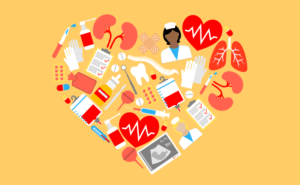Regular intake of vitamin has become very popular. Manufacturers promise to strengthen the immune system, improve the condition of the skin, hair, nails and prevent many diseases. Increasingly, on the shelves of pharmacies you can see vitamins, in the name of which the words “cardio”, “antistress”, “beauty”, “vision” and so on appear. There are vitamins for older people, children, men, women, pregnant women.
Complexes are produced for the heart, skin, bones, vision, but they are all almost the same in composition. Marketers have “cut” the population into thin layers and successfully sell tons of vitamins to the target audience. This is very beneficial for the pharmaceutical business: a person does not get sick with anything, but continues to swallow expensive pills every day. Is it good for the body? Do vitamins really strengthen the immune system, make the skin young and beautiful, strengthen the bones and cleanse the blood vessels?
What is the danger of uncontrolled intake of vitamin
No one asks the doctor if vitamins are needed or not. A person simply sees an advertisement, goes to a pharmacy and buys a drug that he has been drinking for years. For most people, this does not turn into any consequences, but for some people there are problems:
- water-soluble vitamins can adversely affect the functioning of the gastrointestinal tract and nervous system;
- fat-soluble vitamins can accumulate in the body and cause an overdose (hypervitaminosis).
There are four fat-soluble vitamins: A, D, E, K. Vitamins E and K are practically non-toxic. The most severe manifestations of hypervitaminosis occur with an overdose of vitamins A and D.
Symptoms of vitamin overdose
Hypervitaminosis A leads to a violation of the formation of bone and cartilage tissue, their destruction, the deposition of calcium salts in the body. It inhibits protein synthesis, and in chronic overdose it causes osteoporosis.
Hypervitaminosis D causes:
- increased levels of calcium in the blood;
- deterioration of kidney function, up to the development of acute renal failure with a risk of death;
- increased blood pressure;
- cardiac arrhythmias;
- heart failure;lethargy, drowsiness.
Overdose of vitamin E in healthy people almost never happens. There are only cases of erroneous administration of adult doses to young children. At a dose of 100 mg/kg per day, vitamin E leads to severe necrotizing enterocolitis (with bowel death). However, high doses of vitamin E are undesirable for men due to an increased risk of developing prostate cancer, and vitamin E is also not recommended for women with diabetes.
An excess of vitamin K also occurs only in young children. It is manifested by the destruction of red blood cells with the development of jaundice.
Water-soluble vitamins do not accumulate in the body, but some cases of acute overdose occur:
- hypervitaminosis B6 causes a decrease in vibrational and deep proprioceptive sensitivity, impaired coordination;
- hypervitaminosis PP develops with an overdose of nicotinic acid, it is manifested by reddening of the face and a feeling of heat.
When to Take Vitamins
Multivitamin complexes are needed only in special situations, with a high risk of hypovitaminosis, when a person:
- eats very little (for example, losing weight);
- has an increased need for vitamins (gets into extreme conditions);
- recently had a serious illness;
- recovering from injury or surgery.
Read More:Healthy LifeStyle : How To Live A Healthy LifeStyle 2022
In addition, it is important to take vitamins in the presence of problems with digestion, with the stomach and intestines. After all, with stomach problems, for example, with atrophic gastritis, the absorption of iron and B vitamins is disrupted. With a problematic intestine, the absorption of many other vitamins suffers, and the microflora itself ceases to participate in the synthesis of vitamins.
In such situations, in order to improve the condition of the mucosa, and, accordingly, improve the intake of vitamins in the body, doctors use drugs from the rebagit group. As a result, the restoration of the mucous membrane in both the stomach and intestines allows for improved absorption of vitamins.
Vitamins are used for therapeutic purposes in case of hypovitaminosis. But in such situations, not multivitamin complexes are often used, but individual vitamins to eliminate their deficiency. In addition, drugs are used in courses of 1-2 months, and not for years, throughout life.
In advertising, vitamins strengthen the immune system, protect against influenza and coronavirus, stimulate hair growth, improve reproductive function, etc. But all the promised effects are not based on scientific grounds: this is marketing, not medicine. Taking a multivitamin is inappropriate for most people because it has no proven health benefits.
Read More:6 Healthy Lifestyle Tips 2022






